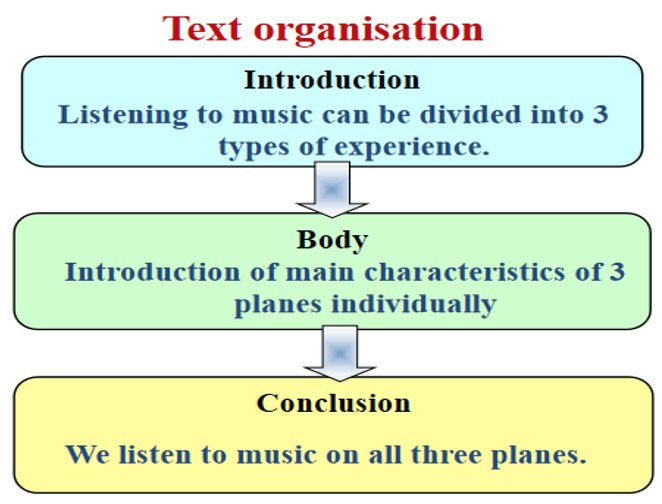知识点一:Text Analysis: How we listen
I. Warming up
(1) What is the article mainly about?
It’s an analytical essay, reasoning about and explaining three different levels of listening to music.
(2) How do you think you listen to music? What effect did the music have you on?
This answer may depend on your experience and knowledge of different kinds of music. But in general, music certainly has great power and has great effect on our emotions and actions.
II. Text analysis
1. Theme
How many types does the writer divide listening to music into? Why?
Do you think the passage is only about the classical music? Why?/ Why not?
What is the writer’s main purpose of writing this article?
2. Style
a) Genre:
narrative essay
b) Diction:
big, complicated, formal words, e.g.
terminology, hypocritical, disproportionate, proclaim
c) Syntax:
long, involved sentences, e.g.
paras. 5,6
3. Structure

4. Detailed Analysis
(1) Why does the writer divide listening to music into three types of experience?
(a) It is important to keep the different types of experience separate.
(b) It makes it easier to understand what is happening when we listen to music.
(c) It is the traditional way of referring to the experience of listening.
(d) Different people listen on different planes, according to the type of person they are.
(2) What is the main characteristic of the sensuous plane?
(a) It is the sort of feeling we get when listening to music on the radio.
(b) It can only be experienced by people who aren’t musicians.
(c) It is a reaction we have which is generated by the sound of the music.
(d) It does not give us any real sense of pleasure.
(3) What is the main characteristic of the expressive plane?
(a) It can only be experienced by intelligent people.
(b) It is when we believe the composer is communicating something to us.
(c) It is a controversial concept; some composers don’t think it exists.
(d) It is most obviously apparent in the music of Stravinsky.
(4) What is the main characteristic of the musical plane?
(a) It can only be experienced by people who have studied to read music.
(b) It is the ability to experience different musical elements.
(c) It is the plane that we experience instinctively, without realizing it.
(d) It is the easiest of the three planes to appreciate.
(5) How do most people usually listen to music?
(a) On only one plane at any given moment.
(b) On all three planes at the same time.
(c) Without paying enough attention.
(d) Without understanding what they are doing.
(6)Why does the writer end the passage by referring to the theatre?
(a) The theatre also offers three types of experience.
(b) Composers are like the characters in a play.
(c) Theatre is the form of art which is most similar to music.
(d) The audience in a theatre are like musicians in an orchestra.
III. Reinforcement:
Discussion
1. Do you think the passage is only about classical music? Why / Why not?
2. Do you agree that we should work harder at listening to music?
3. Do you agree that a great work of art can have different meanings?
4. How great is the power of music?
Through the text analysis, have you known the whole structure of the passage? Next, let’s do some other exercises.
